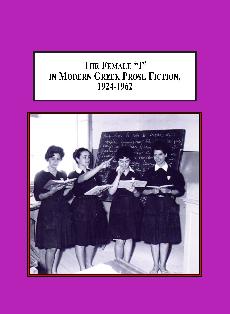Female I in Modern Greek Prose Fiction 1924-1962: A Literary Development of Freeing the Female Voice

| Author: | Camatsos, Efrosini | |
| Year: | 2013 | |
| Pages: | 324 | |
| ISBN: | 0-7734-4073-9 978-0-7734-4073-9 | |
| Price: | $219.95 + shipping | |
| (Click the PayPal button to buy) | ||
In this monograph, Dr. Comatsos analyzes the utilization of female narrators in Greek fiction from 1924-1962 and connects the appearance of women in the public sphere in Greece. The author examines female narrators in nine novels written by both male and female authors using narratology, feminism, and Bakhtin’s polyphony in her inquiry.
She follows the emergence of the female “I” from private forms of writing (diary, journals) to more public ones. She shows how male authors (here, Grigorios Xenopoulos and Nikos Katiforis) use a female voice to justify male patriarchal ideologies. Additionally, she tells stories of women (the artist, Eleni Altamoura) who deal with obstacles set up for them by Greek society.
She follows the emergence of the female “I” from private forms of writing (diary, journals) to more public ones. She shows how male authors (here, Grigorios Xenopoulos and Nikos Katiforis) use a female voice to justify male patriarchal ideologies. Additionally, she tells stories of women (the artist, Eleni Altamoura) who deal with obstacles set up for them by Greek society.
Reviews
“Efrosini Camatsos not only throws valuable light on developments in Greek women’s writing which have hitherto gone unexplored but also studies in an intensified form the ways in which gender effects writing and voice.”
Prof. Christopher Robinson,
University of Oxford
“The argument is set out with exemplary clarity. The introduction sets the scene, first providing sociological and historical information about the status of women in Greek society up to the early 20th century, then turning to late 20th century theory to extract the key concepts in relation to which the Greek texts will be discussed.”
Prof. Roderick Beaton,
King’s College
Prof. Christopher Robinson,
University of Oxford
“The argument is set out with exemplary clarity. The introduction sets the scene, first providing sociological and historical information about the status of women in Greek society up to the early 20th century, then turning to late 20th century theory to extract the key concepts in relation to which the Greek texts will be discussed.”
Prof. Roderick Beaton,
King’s College
Table of Contents
Foreword by Christopher Robinson
Author’s Preface
Introduction
Nineteenth-Century Greek Society: the containment of the female and the female “I”
Feminist narratology: towards a theory of the female “I”
Narratology
Feminism
Bakhtin’s polyphony
Aims and Scope
1. Early uses of the female “I” by male and female authors
The second wave of Greek feminism: the 1920’s
Male authors, female narrators: women’s place upheld
Grigorios Xenopoulos’s Story of a Divorced Woman
Nikos Katiforis’s Piazza
Female authors, female narrators
Galateia Kazantzaki’s Women
Lilika Nakou’s The Deflowered One
2. Speaking through silence: disrupting language
Women, language, and modernism
Melpo Axioti’s Difficult Nights
Maria Ralli’s An Azure Woman
3. “I” or “She”? Shifting Filter Characters Women in society, 1930-1954
Speaking: authority and exclusion
Lilika Nakou’s The Lost Ones
Margarita Lymberaki’s Three Summers
4. Gendered Narration: the case of Dido Sotiriou
The Asia Minor Disaster and Sotiriou
Male vs. Female narrators: The Dead Await and Bloodied Earth
The narration of Aliki Magi
The narration of Manolis Axiotis
Changes between editions of The Dead Await
5. Gender and Marginality?: Kostas Tachtsis’s The Third Wedding Wreath
The narration of Nina
Is Nina’s narration polyphonic?
The Third Wedding Wreath: a polyphonic novel?
Conclusion
Author’s Preface
Introduction
Nineteenth-Century Greek Society: the containment of the female and the female “I”
Feminist narratology: towards a theory of the female “I”
Narratology
Feminism
Bakhtin’s polyphony
Aims and Scope
1. Early uses of the female “I” by male and female authors
The second wave of Greek feminism: the 1920’s
Male authors, female narrators: women’s place upheld
Grigorios Xenopoulos’s Story of a Divorced Woman
Nikos Katiforis’s Piazza
Female authors, female narrators
Galateia Kazantzaki’s Women
Lilika Nakou’s The Deflowered One
2. Speaking through silence: disrupting language
Women, language, and modernism
Melpo Axioti’s Difficult Nights
Maria Ralli’s An Azure Woman
3. “I” or “She”? Shifting Filter Characters Women in society, 1930-1954
Speaking: authority and exclusion
Lilika Nakou’s The Lost Ones
Margarita Lymberaki’s Three Summers
4. Gendered Narration: the case of Dido Sotiriou
The Asia Minor Disaster and Sotiriou
Male vs. Female narrators: The Dead Await and Bloodied Earth
The narration of Aliki Magi
The narration of Manolis Axiotis
Changes between editions of The Dead Await
5. Gender and Marginality?: Kostas Tachtsis’s The Third Wedding Wreath
The narration of Nina
Is Nina’s narration polyphonic?
The Third Wedding Wreath: a polyphonic novel?
Conclusion
